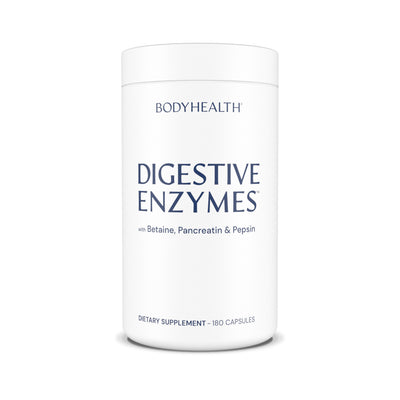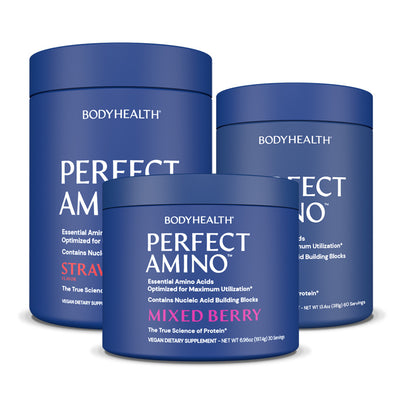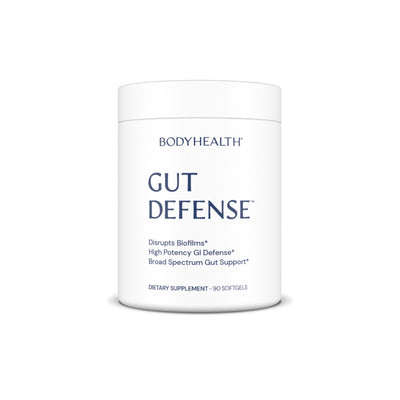What Causes Acid Reflux, Heartburn & GERD
by Dr. David Minkoff September 11, 2023 6 min read

There is an idea that if we have GERD, heartburn or Acid Reflux this means we have too much stomach acid.
Due to this, many people take stomach acid neutralizers or acid blockers, known as PPIs, to make their stomach less acidic and calm it down.
However, these only give a temporary solution, and in the long term actually make the problem worse.
This is because it’s not high levels of stomach acid that cause acid reflux and GERD, but the exact opposite — too little stomach acid.
This is another example of only addressing the symptom instead of the cause, allowing the cause to continue on, slowly worsening over time.
This lessened stomach acid leads to foods, especially proteins, not being fully broken down into a form our bodies can use. So we don’t get the nutrients we need, no matter how much we eat.
And, harmful bacteria are allowed to take root in our stomach and intestines, raising cortisol levels, lowering energy levels, stealing nutrients needed by the cells, preventing muscle gain, causing sugar cravings and more.
And, of course, we get GERD, Acid Reflux, Gas and Bloating.
So lets see what’s happening here.
WHAT CAUSES GERD, HEARTBURN & ACID REFLUX
When we eat, our stomach secretes digestive acid and enzymes. These are necessary to break down the food into a form the cells can use, break down minerals so they can be used, and kill off harmful bacteria, viruses, fungi, and parasites coming in through food and water.
All of these are very important.
Now, there is something called the pH scale, going from 1-15, with 1 being the most acidic and 15 being the least acidic.
When we eat, our stomach secretes acid until it hits a pH of about 1 or 2 (very acidic). Hitting this point signals that the food has been broken down enough and is ready to move on into the small intestine, which opens to let it in.
However, if the stomach doesn’t reach this level, then the food can stay in the stomach longer and go rancid (if you drank milk and then looked at it in the stomach it would look like cottage cheese, not milk anymore).
When it goes rancid it can start to bubble up and hit the esophagus. And while the stomach is made to withstand a very acidic environment, the esophagus is not, so it burns.
It can get so bad that the valve between the stomach and esophagus becomes degraded and may start to let acid in with or without food in the stomach just because you laid down or bent over.
Now, the pH scale is not a straight scale upwards. It goes up by multiples of 10.
So a pH of 2 is 10 times less acidic than a pH of 1. And a pH of 3 is 10 times less acidic than a pH of 2, or… 100 times less acidic than a ph of 1.
That’s a big difference. If a pH of between 1 and 2 is needed, that’s pretty strong. But if we’re only at a pH of 3, that’s much weaker. It’s much harder to break down foods and heartburn and acid reflux is much more likely to occur.
Unfortunately, today, many people have a ph of 4 or 5 — 1000 to 10,000 times less acidic than what is needed. So we see how easy it is for acid reflux to occur.
But look at this now. Getting to a pH of between 1 and 2 isn’t only to break down foods and minerals. It’s also to kill off harmful bacteria, viruses, fungi and parasites.
A pH of 1 or 2 kills these off and fully breaks down food and minerals so they can be used.
But if it’s at a 4 or 5 this is 1,000 to 10,000 times less than what is needed here.
This leads to bacteria making it through to the small intestine where they take root, eating your food and providing gas in return that makes you bloat. They also cause raised cortisol levels and, over time, Leaky Gut, which allows them and other toxins to now enter your blood stream.
And it can get so bad that the stomach itself is so non-acidic that bacteria can start living there, breaking down the cells of the stomach walls and causing even more trouble, including ulcers.
Until this is fixed, and the ph level is lowered to a more acidic environment, GERD, heartburn, and acid reflux will continue, no matter how many pills you take.
In fact, the pills will make it worse over time.
TAKING ACIDS BLOCKERS FOR TOO LONG DESTROYS OUR DIGESTIVE TRACT
Antacids operate by neutralizing the acid in your stomach and so raising the ph level — less acidic. This then alleviates the pain of heartburn or GERD as it’s less acidic.
But it also lets through these harmful bacteria and prevents food breakdown, including protein breakdown.
This last point is a big problem because your stomach acid is made from… the amino acids in protein. If they’re not fully broken down then your body can’t use them to make more stomach acid.
So we eat protein and take antacids and not all of the protein is broken down into amino acids. So there are less amino acids to produce new stomach acid. We take more antacids and break down even less protein, and get even less amino acids for new stomach acid, and so on.
Then, as we get this continued lowering of stomach acid production over time, leading to a less and less acidic environment, we get more heartburn and so take even more antacids.
Now, that’s antacids. Acid Blockers, or PPIs, are a bit different. PPIs stands for Proton Pump Inhibitors. The Proton Pumps are the glands that secrete stomach acid.
PPIs operate by poisoning these proton pumps so they produce less acid, so they literally can’t function as they’re supposed to.
Now, if someone has something like a bleeding ulcer, an actual wound in the stomach, these can be necessary as we need to lower the acid levels so the wound has a chance to heal.
But… once it’s healed we need to come off them and build back up our stomach acid levels or we’ll be causing ourselves a lot more trouble than just a wound in the stomach.
As PPIs operate by poisoning the glands that secrete acid, over a long period of time these glands can become so damaged that even when we come off the PPIs it takes a long time for the glands to heal so they produce acid properly again.
The longer we’ve been on the PPIs, the longer it takes the glands to heal if they even can fully at that point.
So this is very important. Only take them when actually needed, no longer.
HOW WE ADDRESS ACID REFLUX, HEARTBURN & GERD
If we have Acid Reflux, Heartburn or GERD then we have lower levels of stomach acid. Period.
So first, we need to get off any acid blockers, antacids, and even soda water, which also lessens acidity. If you are on any antacid medications prescribed by your doctor, make sure to consult them when doing this.
We then need to start taking Digestive Enzymes to provide the Stomach Acid and Enzymes the stomach needs to fully break down food and kill off bacteria and parasites coming in. Because if we have one of the above situations, then we already know we don’t have enough.
Next, we need to start getting in more protein and taking the enzymes to ensure it’s broken down fully so the body can use it, as it’s protein that the body uses to make more stomach acid and digestive enzymes. If we don’t do this then the situation will continue indefinitely.
This is one place PerfectAmino becomes very important. It not only provides the amino acids needed to synthesize protein and produce more enzymes and stomach acid, but it also helps to heal the cells injured by the effects of low stomach acid.
For Acid Reflux, Heartburn, and GERD, PerfectAmino and Digestive Enzymes are a very winning combination.
Take 1-2 digestive enzymes with each large email, plus 2-3 serving of PerfectAmino per day for two weeks and see how much better you feel.
And, if you haven't seen the Gut Health Challenge, I highly recommend you check it out!
Just use the code GUTHEALTH for 10% off the Gut Health Collection.
And make sure to join our PerfectAmino VIP Group if you haven’t already, where you can ask all of your questions and we can help you with anything you need.
I think you’re going to love this.
Articles by Health Topic
Get “The Search for the Perfect Protein”
by Dr. David Minkoff
Signup for the BodyHealth Newsletter and get a FREE digital copy of "The Search for the Perfect Protien" by Dr. David Minkoff and discover the key to weight loss, depression, fatigue, insomnia, and osteoporosis!
*These statements have not been evaluated by the Food and Drug Administration. These products are not intended to diagnose, treat, cure, or prevent any disease.


